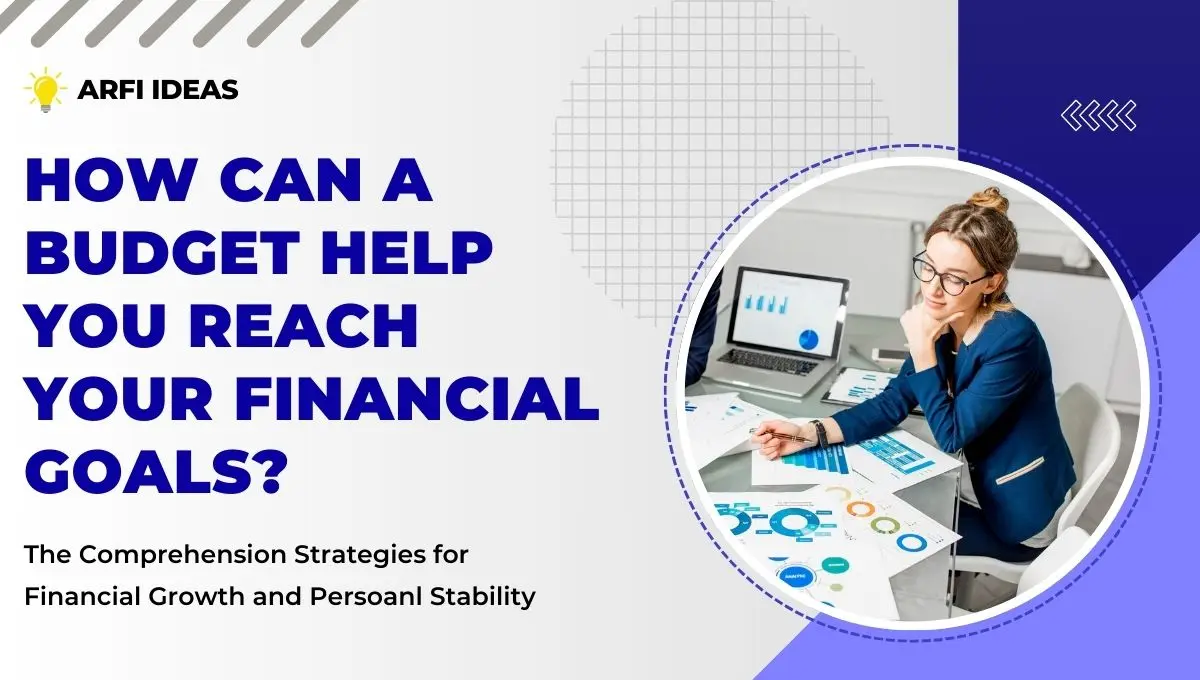How can a budget help you reach your financial goals? Creating a budget is one of the most effective ways to take control of your financial future.
It serves as a financial blueprint that helps you track your spending, set realistic goals, and ensure you’re moving in the right direction.
By developing a well-structured budget, you gain clarity on allocating your income toward the things that matter most.
These can include saving for retirement, paying off debt, or building an emergency fund.
Why Budgeting is the Key to Financial Success?
A budget allows you to understand exactly where your money is going each month. It also helps prevent overspending and ensures you’re saving for the future.
Not only does this give you peace of mind, but it also provides you with a clear path to reaching important financial milestones.
Whether you’re saving for a down payment on a home or building an emergency fund, a budget creates a system to help you achieve these goals while managing your day-to-day expenses.
One of the most powerful aspects of budgeting is that it forces you to decide what your financial needs and wants are.
Without a clear plan, you might find yourself overspending on non-essential items or struggling to pay off debt.
In the following sections, we’ll explore how budgeting empowers you to save, plan, and grow your finances, ensuring a brighter, more secure financial future.
How Budgeting Help You Save and Reach Short-Term Goals?
Creating a budget is an essential first step toward achieving your financial goals.
A well-organized budget allows you to plan your needs while gaining a clear understanding of your spending habits.
By setting short-term financial goals and sticking to a budget, you can save more effectively and allocate your income to what matters most.
Track Your Spending to Save More
A well-planned budget isn’t just about tracking expenses—it’s about prioritizing your financial goals and making sure you have a clear path to achieving them.
How can a budget help you reach your financial goals? It starts by helping you focus on savings for short-term priorities.
It includes building an emergency fund, paying off smaller debts, or setting aside money for planned expenses like vacations or a new car.
The first step in saving effectively is to track your income and expenses. A budget gives you a clear view of where your money is going, allowing you to identify areas where you may be overspending.
For example, small daily expenses like coffee or takeout can add up quickly, and a budget helps you spot these spending patterns so you can make more informed decisions.
How to Allocate Funds Effectively?
You can allocate your income more effectively with a better understanding of your spending habits.
One method that works well for many is zero-based budgeting—where every dollar has a purpose, whether it’s for groceries, bills, or savings.
By giving every dollar a job, you can ensure you’re saving consistently each month without overspending.
Using Zero-Based Budgeting to Control Your Expenses
Zero-based budgeting forces you to plan every dollar, helping you focus on saving. It’s especially useful for those with irregular income or unexpected expenses.
This method ensures that every bit of income goes toward either an expense or a savings goal, keeping your budget lean and efficient.
By focusing on your savings goals through a budget, you can create a reserve of cash.
It will not only prepare you for unexpected expenses but also bring you closer to achieving your short-term goals.
This approach lays the foundation for financial stability and puts you in a position to grow your savings over time.
Paying Off Debt with a Budget: A Step-by-Step Plan
Paying off debt can be challenging, but a properly planned budget provides a clear path to success.
By organizing your income and expenses, you can focus on debt repayment while still meeting basic financial needs.
Budgeting helps you stay disciplined and motivated, turning your debt-free dreams into reality.
Using a Budget to Accelerate Debt Repayment
Debt can be stressful, but a well-organized budget can help you develop a clear plan for paying it off.
How can a budget help you reach your financial goals when you are in debt? The answer is to use your budget to set aside money for debt repayment while still managing other necessary expenses.
Start by listing all your debts, including credit cards, student loans, car payments, and any other loans.
Once you have a clear picture of your total debt, you can apply effective payoff strategies, such as the debt snowball or avalanche method.
Snowball vs. Avalanche Debt Payoff Techniques
- The Snowball Method: This method focuses on paying off your smallest debts first. By knocking out these smaller balances, you gain momentum and motivation to continue. Once one debt is fully paid off, you roll over the money you were paying on it into the next smallest debt.
- The Avalanche Method: On the other hand, target those first debts that have the highest interest rate. This approach may save you more money in the long run since you’ll be reducing the overall amount of interest paid over time.
You can use both strategies in your budget, but the key is to stay consistent. Set aside a percentage of your monthly salary for debt repayment.
This could be done by reducing discretionary spending, such as eating out or entertainment, and allocating that money toward your debts.
How to Stay Motivated While Paying Down Debt?
Budgeting has a positive effect on your finances by ensuring debt payoff doesn’t throw off your other money goals.
Zero-based budgeting tools let you account for every dollar you earn. This makes it easier to send extra money to pay off your debts while saving for unexpected costs or future expenses.
It’s key to monitor your progress. Many common budget apps can help you keep an eye on your debt payoff journey. This keeps you on track and fired up.
Adding a specific category for debt payoff in your budget means you’re working to achieve financial freedom. At the same time, you avoid taking on more debt down the road.
Building an Emergency Fund: Why It Matters
An emergency fund is one of the most important parts of a solid financial plan.
You can create a safety net that protects you from bankruptcy by setting aside savings for unforeseen expenses.
But how can a budget help you reach your financial goals, especially during times of uncertainty?
A budget provides the discipline and foundation you need to save consistently and prepare for life without sacrificing your other financial goals.
Planning for the Unexpected with an Emergency Fund
An emergency fund is a must-have for any financial plan. It is a safety net that protects you from unexpected expenses like medical emergencies, car repairs, or job loss.
How can a budget help you reach your financial goals when life throws you a curveball?
By ensuring you’re consistently setting aside money for these unplanned expenses, a budget provides the framework you need to build a reliable emergency fund.
How to Budget for Emergencies Without Sacrificing Your Lifestyle?
Experts say that you should save 3-6 months’ worth of living expenses. That sounds crazy at first, but a budget helps you break it down into smaller steps.
By setting a specific amount to save each month, even if it’s a small portion of your income, you can build your emergency fund without feeling pinched.
If you want to save for emergencies, allocate a portion of your budget for that.
Many people find success with the 50/30/20 rule, where 20% of their income goes to savings—this includes emergency funds and long-term savings.
You can also automate your savings so a fixed amount goes into a separate account every time you get paid.
If you have an emergency fund in your budget, it will help you avoid financial setbacks that can derail other goals like paying off debt or saving for retirement.
Planning for Long-Term Goals: From Retirement to Big Purchases
Creating a budget can make a significant difference when it comes to major life goals such as purchasing a home, enjoying a comfortable retirement, or making a large sale.
A well-structured budget not only helps you plan for the future but also helps you find ways to balance short-term needs with long-term goals.
You can achieve your financial goals by allocating your resources and maintaining discipline.
Setting Long-Term Financial Goals
Although short-term financial wins are very important, budgeting shines when it comes to planning for long-term financial goals.
Whether you’re dreaming of owning a home, funding your child’s education, or retiring comfortably, a budget helps you map out a clear plan to reach these milestones.
The key question is, how can a budget help you reach your financial goals over the long haul?
Start by identifying your specific long-term goals and breaking them down into actionable steps.
For example, if you’re planning to buy a home in five years, calculate how much you’ll need for a down payment and closing costs.
If retirement is your focus, consider how much you’ll need based on your lifestyle and set realistic saving targets.
Prioritizing Savings for Retirement
One of the most popular long-term goals is to save for retirement. Using your budget to allocate a portion of your income to retirement savings is critical, especially if your employer offers a 401(k) match.
You can take advantage of tax-advantaged retirement accounts like 401(k)s or IRAs and automate your contributions so you’re consistently building your retirement fund without having to think about it.
A well-structured budget makes it easier to prioritize retirement savings while still covering other goals like buying a house or investing.
Tools like the 50/30/20 rule can help you balance savings across multiple goals.
The Role of Financial Tools and Apps in Budgeting
Technology is continuously advancing, so finance administration has become easy, efficient, and accessible to everyone in the world.
You can easily track expenses, monitor your income, and make proper decisions for your financial future with the new financial tools and budgeting applications introduced to the world.
These tools can easily be integrated into your financial plan, significantly enhancing your budgeting process and keeping you organized in the pursuit of your financial goals.
Leveraging Technology to Enhance Your Budgeting Efforts
Finance management is getting easier, faster, and more generic for everyone in this world because technology has gone too far.
How can a budget help you reach your financial goals? By using advanced technology, you can make the process of budgeting much simpler and track your monetary goals.
Many budgeting apps allow real-time tracking of income and expenses, thereby providing insights into where you are spending the money.
Apps like Mint, You Need a Budget (YNAB), and PocketGuard can sort out transactions categorically, and you know where your money is going.
Besides, these budgeting software tools come along with built-in templates or even specific features that make it easier towards savings and debt repayment effortlessly.
Setting Reminders and Alerts
Most apps have reminder features and alert functions that notify you when the bills are due or when you are close to reaching your budget limits.
With this feature, you are saved from any late fees, and it encourages you to stick to your financial plans.
Visualizing Your Financial Progress
Another benefit of using budgeting apps is the ability to see your financial progress.
Many applications have graphs and charts that show you your spending habits and how much you are saving toward your goals.
When you see these goals becoming a reality, it will motivate you more to do the budgeting because it reminds you of why you are doing this.
These technological tools help you improve the budgeting process, and it becomes much easier to reach your financial goals.
Whether you are trying to save for a vacation, pay off debt, or build your emergency fund, here are resources that will help keep you organized and accountable, ultimately saving, planning, and growing your financial future.
Tips for Sticking to Your Budget
Creating a budget is just the first step; the true issue is sticking to it. Here are some practical tips to help you stay committed to your budget and reach your financial goals:
1. Set Realistic Goals
Make sure your budget matches your actual income and expenses. Setting achievable financial goals makes it easier to stick with you without feeling a lack of resources.
2. Review and Adjust Regularly
Life is continuously changing, as are your financial demands. You must plan on reviewing your spending plan on a monthly or quarterly basis and making any necessary adjustments. This keeps your budget fresh and useful.
3. Use Cash for Discretionary Spending
Focus on paying with cash for luxuries like entertainment or eating out. This strategy is useful because when the money runs out, you will know it’s time to stop spending.
4. Celebrate Small Wins
Celebrate your budgeting successes, whether they include reaching a savings goal or paying off debt. Rewarding yourself can help you stay motivated and strengthen sound financial practices.
5. Stay Informed
Learn about personal finance by reading books, listening to podcasts, or starting a blog. You will be more capable of making wise financial decisions if you have more knowledge.
By implementing these tips, you can strengthen your commitment to your budgets and create a solid basis for financial success.
Resources for Further Learning
If you want to enhance your budgeting skills and learn more about personal finance, consider exploring the following resources:
Books
These are some of the suggested books by experts:
- “The Total Money Makeover” by Dave Ramsey: This classic provides practical advice on budgeting, saving, and getting out of debt.
- “Your Money or Your Life” by Vicki Robin and Joe Dominguez: A transformative guide that teaches you to manage your money while aligning it with your values.
Podcasts
These are some of the suggested podcasts to listen to:
- “The Dave Ramsey Show”: Get expert advice on budgeting, debt reduction, and investing.
- “The Money Guy Show”: It offers tips on financial planning, investing, and achieving your financial goals.
Websites
These are some of the advised websites to help you out:
- NerdWallet: A wealth of articles, calculators, and resources on budgeting and personal finance.
- The Balance: It provides straightforward advice on managing your money and making informed financial decisions.
Online Courses
If you are looking for the courses, here are some suggested and top-rated platforms:
- Coursera and Udemy: Both platforms offer a variety of courses on budgeting and personal finance that cater to all levels of expertise.
Final Thoughts
It is very important to understand how can a budget help you reach your financial goals because everyone is looking to take control of their financial future.
Creating a structured budget will help you save, pay off debt effectively, and plan for short- and long-term financial objectives.
Budgeting empowers you to make informed decisions about your spending habits, which leads to greater financial security and peace of mind.
Remember that budgeting is not a one-time activity but a process; you should check and review your budget regularly to have it in line with the changing situation of your finances or goals.
Well-managed budgets keep you on track as well as accountable in almost all matters, whether it would be building an emergency fund, saving for retirement, or planning for a big purchase.
All this can be further simplified through financial tools and apps to make tracking your progress and thus staying motivated easier.
You are saving not only money but also an investment in your future while committing to your personal budget and staying disciplined.
I hope you enjoyed reading the content. Please share it and join us on Arfi Ideas for the latest updates on such topics.
FAQs About How Can a Budget Help You Reach Your Financial Goals
Q1. Can a budget help you reach a financial goal by VB?
Yes, a budget can help you achieve your financial goals. It’s like your gateway to your finances, showing you your monthly expenses and helping you save money easily.
By tracking your spending and setting limits, a budget can ensure you’re moving closer to your goals, whether it’s saving for a big purchase, paying off debt, or just good financial habits.
Q2. How does a budget help you fulfill your needs and wants?
A budget helps you meet your needs and desires by organizing your money to prioritize important expenses such as housing, food, and debt.
It also allows you to set aside money for things you like or need in the future. Through careful planning, a budget can help you balance spending and saving so you can achieve your goals without overspending.
Q3. What are the 3 benefits of using a budget quizlet?
Here are three benefits of using a budget in Quizlet:
1. Better Financial Intelligence: It helps you understand where your money is going and informs how you spend it.
2. Goal Accomplished: A budget makes it easier for you to save money and achieve specific financial goals.
3. Reduce Stress: Managing money through a budget can reduce financial stress and help you avoid overspending.
It’s a simple and effective way to take control of your money.
Q4. What are two things to consider when setting up your personal budget?
When you are setting up your personal budget, think about how much you make and how much you spend. If you do not know the money coming in monthly, then you will end up overspending.
Create a list of all regular expenses spent, including such things as rent, utilities, and groceries, so you can see where the money is being spent and where you could cut back.
Q5. How can you relate opportunity costs to budgets?
Opportunity cost refers to your budget and shows what you are giving up when you decide to spend money somewhere.
When you create a budget, you decide where to allocate your money, knowing that if you spend money on one thing, you can’t spend it on something else.
Considering opportunity costs can help you make better choices that align with your financial goals.




